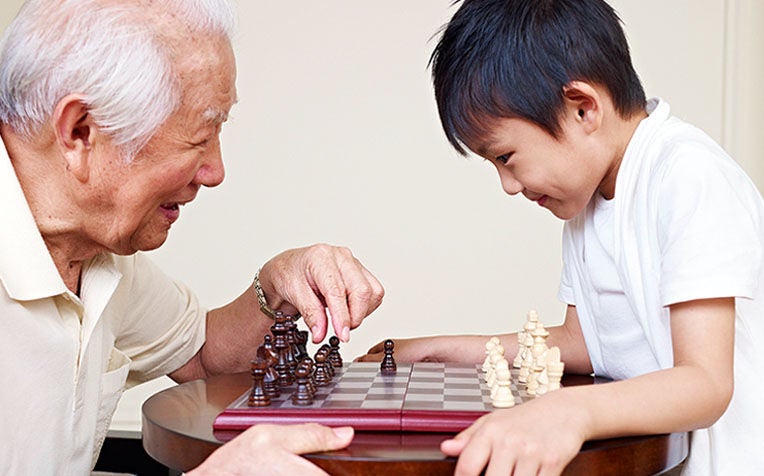
Spending quality time is one way a child can help improve the recovery of an elderly loved one who survived a stroke.
When stroke strikes, it can be scary and worrying for children to see family members having difficulty with everyday activities, such as walking and talking.
“Explaining to children what a stroke is helps them understand why their loved one’s abilities have suddenly changed. Teaching them what they can do to assist can also ease their fears and provide real help to stroke survivors in their long recovery journey,” says Senior Staff Nurse Quek Yi Ping from the Department of Nursing at National Neuroscience Institute (NNI), a member of the SingHealth group.
Age is no barrier to helping someone who has had a stroke. Small simple actions by children as young as 7 years old can make a big difference to the recovery of a stroke survivor. NNI has produced a short animated video to help parents explain to their children what happens during a stroke, the challenges it causes and how children can provide support and understanding to stroke survivors (scroll down the page to see the video).
Here are four ways a child can help with a loved one's stroke recovery journey.
Stroke recovery: 4 Ways children can help
1) Ask your child to be patient, to speak slowly and listen carefully when communicating with the stroke survivor
Speech problem such as slurred speech is one of the common problems after a stroke. Speech difficulties can be frustrating for both the stroke survivor who is unable to express their wants and needs, as well as for loved ones who want to help but cannot understand what they are saying. The good news is that with patience and practice, the stroke survivor is likely able to improve or regain his/her speech.
How your child can help:
Ask your child to speak slowly, listen carefully and be patient when talking to the stroke survivor. Ask your child to repeat if necessary and allow the stroke survivor more time to respond. Chit-chatting about their day at school, singing and reading to each other are ways that a child can help the stroke survivor regain his/her speech while having fun together.
2) Champion an active lifestyle by advising your child to exercise together with the stroke survivor
Daily exercise improves mobility and prevents stiffening of muscles, helping stroke survivors regain as much independence as possible. However, the recovery journey from stroke can take months and maintaining motivation to exercise is often challenging, especially when done alone.
How your child can help:
Ask your child to do the rehabilitation exercises with the stroke survivor – this is especially useful if they live in the same household as it can become part of their daily routines. Playing music while exercising together also makes it more enjoyable. Going for walks and visiting the playground and exercise corners together can be fun for both the child and their grandparent. Do make sure the stroke survivor is accompanied by an adult if their mobility is poor to reduce the risk of falls.
Tip! To view exercise videos to help with stroke recovery, download the SingHealth Health Buddy app and tap on Specialty Care to launch Stroke Buddy. For more information, click here. The exercises can also be viewed here. |
3) Promote responsibility to your child by having him/her remind the stroke survivor to take medication
Most people who have a stroke have either high blood pressure (hypertension), high cholesterol or both. Taking medication as prescribed by the doctor to control these and other risk factors is important to reduce the chance of the stroke survivor having another stroke.
How your child can help:
Share the medication schedule with your child (if he/she is upper primary or older) so that your child can remind the stroke survivor to take medication at the correct time. Children also tend to be good with mobile phones and can help the stroke survivor by setting recurring alerts on the mobile phone to serve as a daily reminder to take medication at a fixed time.
Medication reminders can also be set on the Stroke Buddy feature of SingHealth’s Health Buddy app!
Important! Always keep medication out of the reach of young children to prevent accidental poisoning and remind them that they should never take medicine unless advised to do so by a parent or responsible adult as it can cause them serious harm. |
4) Encourage your child to spend more time with the stroke survivor
The sudden onset of stroke is often shocking and can be life-changing for most of stroke survivors. A loss of physical independence can lead to social isolation and depression unless they have support from family and friends. Being around people and socialising is important for the mental and emotional well-being of stroke survivors.
Spending time with friends and loved ones, chatting and doing simple activities together such as cooking, playing mahjong and going for walks help stimulate the mind and maintain a supportive ties with the family and in turn will exert a positive influence on the recovery journey of the stroke survivors.
How your child can help:
Take your child to visit the stroke survivor once he or she is allowed to return home from hospital. If your child has a lot of energy, consider doing short daily visits to avoid tiring out the stroke survivor. Going to the local park or visiting attractions such as Gardens By The Bay are good ways for the whole family to spend time together and provide stimulation and bring joy to the stroke survivor.
Watch the video below and see how easy it is for children to be heroes to stroke survivors!
Ref: J22
Check out other articles on stroke:
When Stroke Strikes During Sleep
Beware of a Mini Stroke – TIA (Transient Ischaemic Attack)
Suffered a Stroke? 5 Questions to Ask Your Doctor
Contributed by


















 Get it on Google Play
Get it on Google Play